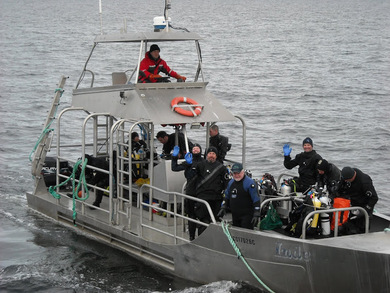
1. Arrive on time: Dive boats generally run on a very tight schedule to accommodate multiple departures throughout the day. To ensure that the dive trip runs smoothly, most dive shops will list both "meeting times" and "departure times". Divers should arrive at the designated meeting point by or before the meeting time to allow sufficient time to check in and fill out paperwork. The departure time is the time the dive boat will actually leave the slip with all the divers on it. Most dive boats will not wait for a late diver, and many a diver has arrived to the boat slip to find it empty. If you are late, don't ask for a refund. Your space could have been used by another diver.
2. Wait to Board the Boat Until the Captain or Guide Asks You To: Preparing a dive boat for divers takes work. The captain and crew need space and time to ensure that the boat is organized and ready for divers to board. Until the dive boat is ready, you and your gear will just get in the way of the crew trying to do their job. While it is great to be early and prepared, don't take you enthusiasm to point of appearing impatient.
3. Listen to the Boat Safety Briefing: Either the captain, guide, or a member of the crew will give a detailed boat briefing at the beginning of the trip. Listen to this briefing with your undivided attention. The briefing will cover important safety information regarding emergency procedures and helpful tips such as the location and use of the marine head (toilette) and the location of drinking water and rinse buckets.
Be sure to take note of underwater diver recall signals. Commit the dive boat and captain's names to memory -- these will come in handy should you get separated from the group and need to ask another dive boat for help. Finally, keep in mind that ignoring the briefing is disrespectful and will alienate the captain or guide speaking (not something you want to do). While you may have already heard the briefing, others on the boat may have not, and your fidgeting/chatting will distract them.
4. Use as Little Space As Possible:Board the dive boat with your dive gear in a small, foldable mesh bag - not the big, rolling suitcase that you used to transport you gear through the airport. Once your gear is assembled, fold your gear bag and stow it away. Pack your gear bag so that you can remove items in the order that you will use them. This allows you to remove one piece of gear at a time from your gear bag and put it directly onto the tank. Never spread your gear across the deck or bench. Not only does this take up other divers' space, but it exposes your gear to damage. Many adive mask has lost its life by bouncing off the bench into the water or being crushed under foot.
5. Avoid Placing Heavy Objects on Raised Surfaces: While gearing up, do not place heavy objects, such as weight belts, on raised surfaces. An unexpected bump or turn may cause heavy items to fall off of tables and benches and onto feet or breakable gear.
6. Assemble Your Gear Before You Reach the Dive Site:Unless otherwise instructed, assemble your gear after the briefing and be sure that it functions before reaching the dive site. This allows you time to troubleshoot any minor problems. If you are still fumbling with gear after reaching the dive site, you risk holding up your group or buddy and shortening the dive time.
More tips for easier diving:• 8 Methods of Preventing a Foggy Mask
• When and How to Use Trim Wieghts
• How to Relax on the Surface
7. Rinse Masks and Other Gear in the Designated Rinse Buckets:Many dive boats provide fresh water rinse buckets for rinsing masks, cameras, and other gear. Rinse masks in the mask bucket, cameras in the camera bucket, and other gear in appropriate buckets. Photographers do not want your spit or defog solution on their $10,000 photography equipment, and no one wants your wetsuit in the same bucket used to rinse regulators. Similarly, if you (like me) use spit to defog your mask, use your hand or a cup to take water from the mask rinse bucket and put it into your mask. Do not dip your spit-in mask into the rinse bucket. Your spit may work well for you, but some divers may prefer other defogging methods.
8. By Ready to Go When Approaching the Entry Platform:Before shuffling to the entry platform, be sure that you are completely ready to go. Not only is it difficult to zip up your wetsuit or don your weight belt while standing on a rocking boat with your fins and tank on, it causes everyone behind you to wait.
9. Follow Recommendations When Boarding the Boat Post-Dive: Many diver operators will give specific protocols for boarding the boat after a dive -- follow them. If the captain wants divers to remove their tanks and buoyancy compensators (BCs)before climbing the ladder, there is usually a reason. Don't ignore this advice and attempt to board the boat with your gear on if you have been asked not to. Pay attention to boarding protocols, the order of gear removal, and whether or not BCs should be handed to the captain with integrated weight pockets attached or not. Always remove your weight system before your BC (so you don't sink to the bottom) and never, never, get under the ladder until the previous diver has safely climbed onto the boat. If the diver before you slips or falls off the ladder, he will land on you!
10. Wait to Use the Head Until All Divers Are on Board: Diving lore abounds with stories of divers making safety stops or decompression stops near the boat only to get an unpleasant surprise when the toilet is flushed. Common courtesy dictates that divers wait until everyone is on board before flushing the toilet.
11. After the Dive, Keep Dry Areas and Objects Dry: This is common sense, but be mindful of where you place your wet dive gear and wetsuit after a dive. Be careful not to place wet objects on or near other diver's towels, dive logs, and clothing. Also, do not enter dry, clean areas such as the boat's cabin wearing wetsuits or dripping clothing. Keep the boat nice for future use.
12. Don't Compete With the Other Divers on the Boat: One of the behaviors I hate the most is when a diver starts bragging about how much air he has left after a dive, and compares it with other divers' tank pressures. No one is going to give you a gold star for having the lowest air consumption rate. In fact, no one cares. Try to keep the posturing and bragging to a minimum, and be polite and respectful to other divers.
13. Thank and Tip the Captain and Crew: Tips for the captain and crew are customary. Be sure to thank the captain and crew after the dive and tip them appropriately. Plan to tip ahead of time, and be sure to bring the money on board with you. If you require special assistance - such as having cameras, tanks, or other gear passed to you in the water, throw in a little extra cash to show the crew that you appreciate them going out of their way to help you.
By Natalie Gibb, About.com Guide
DIVE WITH DIVESTRONG IN THE BAHAMAS ABOARD THE AQUA-CAT - SIGN UP NOW.

 RSS Feed
RSS Feed





